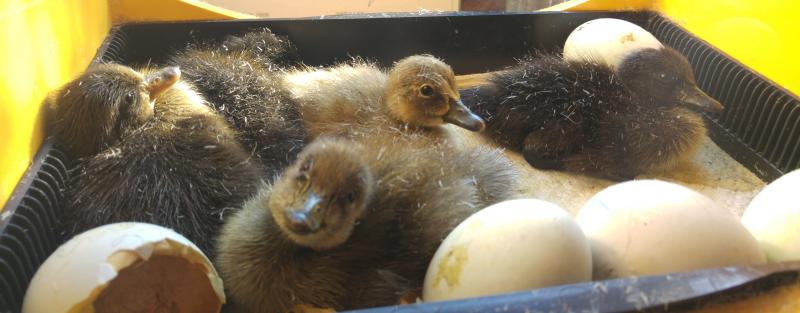A Well-Hatched Duckling is a Happy Duckling!
While I’m not ready with a technical comparison of this year’s incubation attempts, I would like to share an observation.
With the four batches of our own runner duck eggs I have incubated in total (two batches last year and two batches this year, this far), I have noticed an interesting correlation between the ease of hatching and the behaviour of the ducklings.
Last year, the first batch was a success (with 10 ducklings hatching easily and without help) and these birds were very alert, busy, curious and quite friendly. The second batch had eggs with too hard shells, had evaporation problems and consequently, had hatching problems. We had several help-outs and some eggs failed to hatch. The ducklings that did survive, were kind of prone to panic, a lot more passive than the first bunch, and as they grew, they preferred to lay down as often as possible. All the 7 birds that grew up were drakes. A couple of them were nice and I even sold one, but most of them ended up on our dinner table.
In my previous post I wrote about the first incubation of this year, which was a failure, a lot worse than last year’s second batch. What I did notice about the ducklings that survived, was that again, they are kind of passive, they start panicking really easily, and they have leg and posture problems. Luckily, the only female one of the 5 birds that are still alive, is really nice and good-looking.
And now, this year’s second incubation was quite a success!
In this video, we can see a part of a perfect hatching process – the duckling has broken a wide enough opening into the egg shell, to get out of it comfortably.
Namely, after my failure, mostly all about egg shell thickness, I changed the percentage of different feed components and waited until the shells got thinner (eating the eggs is a nice way of testing for shell quality as well). I selected quite even-sized eggs (around 70 grams) and observed as their mass started dropping really as expected during incubation. Also, most of the eggs grew a by-the-book air sac.
And voila! Of the 9 eggs that were fertile, 7 developed nice air sacs and exactly these eggs hatched quickly and without any help needed. The rest did not hatch at all – a weird mismatch between expected weight loss and small air sacs. Unfortunately, one of the ducklings had a neck deformation and had to be culled. The rest of the birds remind me of our very first ducklings – again, they are alert, busy, curious and quite friendly. It seems that spending too long time in the hatching process affects so many factors of the health of the ducklings, not only their posture.
Here are some of the hatched ducklings on their first morning.
 Hello, world!
Hello, world!
A well-hatched duckling is a happy duckling!